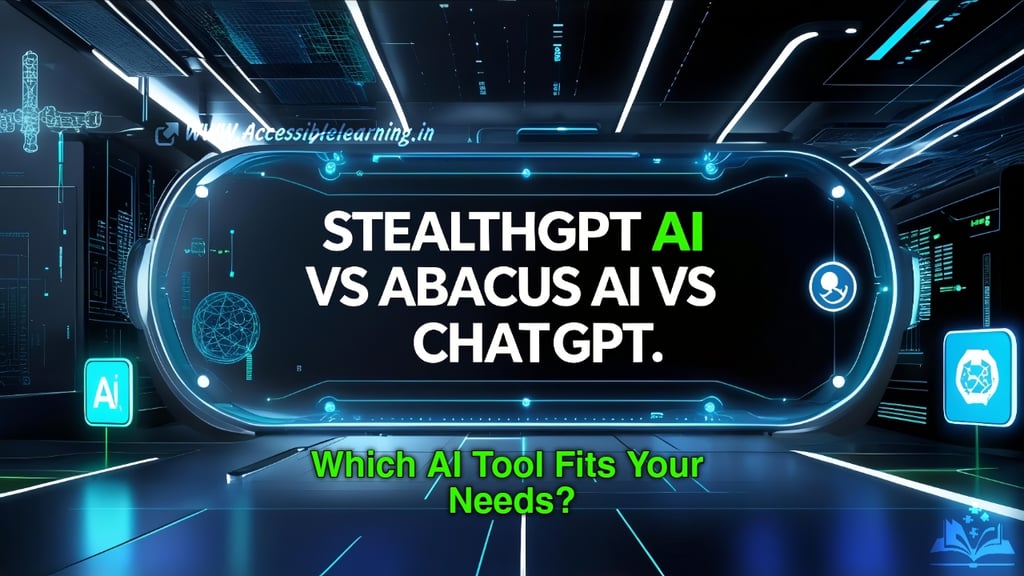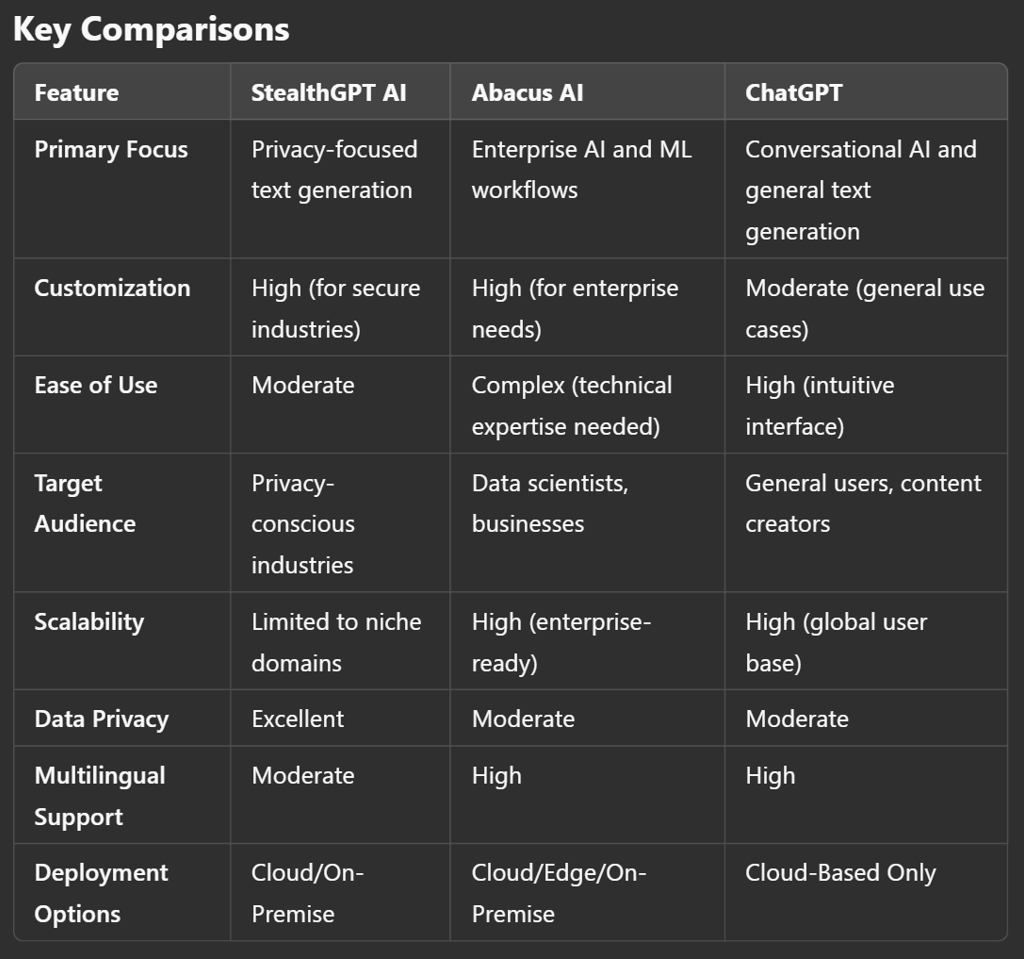
StealthGPT AI vs Abacus AI vs ChatGPT: Which AI Tool Fits Your Needs?
Discover a comprehensive comparison of StealthGPT AI, Abacus AI, and ChatGPT. Learn about their features, use cases, strengths, and limitations to choose the best AI tool for your needs—whether it's privacy-focused text generation, enterprise AI workflows, or versatile conversational capabilities.
AI ASSISTANTAI/FUTUREEDITOR/TOOLSEDUCATION/KNOWLEDGEAI ART TOOLS
Sachin K Chaurasiya
1/15/20255 min read


Artificial intelligence (AI) is rapidly transforming industries, reshaping how businesses and individuals interact with technology. Among the plethora of AI tools available, StealthGPT AI, Abacus AI, and ChatGPT have emerged as leading names in their respective niches. Each offers unique capabilities, appealing to diverse audiences and use cases. This article explores their strengths, differences, and potential applications, providing you with a clear understanding of which tool might best suit your needs.
StealthGPT AI
StealthGPT AI is designed for privacy-conscious users who need a text-generation tool for sensitive or confidential applications. Its primary focus lies in ensuring anonymity, data security, and compliance with strict privacy standards. It has gained popularity among industries like legal, healthcare, and finance, where secure AI applications are critical.
Key Features
Data Privacy: Guarantees no data storage or retention during interactions.
Niche Specialization: Tailored for industries requiring high compliance with regulations like GDPR and HIPAA.
Customizable Solutions: Allows businesses to fine-tune the AI for domain-specific requirements.
Natural Language Generation: Provides high-quality, human-like text outputs.
Additional Insights
StealthGPT is particularly valuable in scenarios where confidentiality is non-negotiable. For instance, law firms can use it to draft sensitive documents, and healthcare providers can rely on it for patient communications without risking data breaches. Its focus on discreet, secure AI solutions makes it a strong contender for niche industries, but this focus can limit its versatility for general users or creative tasks.
Recent Updates
Introduction of on-premise deployment options for organizations with stringent data security requirements.
Enhanced support for multilingual text generation, catering to global audiences.
Use Cases
Handling sensitive or confidential text-generation tasks.
Working in regulated industries like healthcare or finance.
Prioritizing data privacy and compliance above all else.
Strengths & Limitations
Strengths: Exceptional data privacy, niche focus, customizable for sensitive industries.
Limitations: Limited versatility; not ideal for general users.


Abacus AI
Abacus AI stands out as a platform for enterprise AI development and deployment, emphasizing end-to-end machine learning (ML) workflows. It excels in building, managing, and scaling custom AI models for business applications, catering to data scientists and engineers.
Key Features
Automated ML Pipelines: Simplifies the AI model lifecycle, from data preparation to deployment.
Real-Time AI Applications: Offers robust solutions for recommendation systems, forecasting, and anomaly detection.
Customizable Frameworks: Supports integration with existing data ecosystems and frameworks like TensorFlow or PyTorch.
Model Monitoring: Ensures real-time tracking and optimization of AI models post-deployment.
Additional Insights
Abacus AI’s versatility makes it a powerful tool for industries like e-commerce (personalized recommendations), finance (fraud detection), and manufacturing (predictive maintenance). Its ability to handle large-scale data operations and deploy real-time AI applications provides a competitive edge for enterprises aiming to leverage AI across multiple business units. However, the platform’s steep learning curve and technical demands might alienate smaller businesses or non-technical users.
Recent Updates
Expanded support for edge AI deployments, enabling businesses to run models closer to data sources for faster processing.
Advanced tools for explainable AI, helping users understand and interpret model predictions.
Use Cases
Developing complex AI solutions for business operations.
Automating and scaling machine learning workflows.
Needing real-time AI insights for enterprise applications.
Strengths & Limitations
Strengths: Enterprise-grade scalability, robust ML capabilities, seamless integration with data ecosystems.
Limitations: High complexity, requires technical expertise.


ChatGPT (Powered by OpenAI)
ChatGPT is arguably the most widely recognized name among conversational AI tools. Powered by OpenAI's GPT (Generative Pre-trained Transformer) architecture, it is a versatile AI designed for natural language processing (NLP) tasks, excelling in conversational AI and general-purpose text generation.
Key Features
Conversational Excellence: Offers highly engaging and context-aware dialogues.
Versatile Applications: Suitable for customer support, content creation, education, and personal use.
Fine-Tuning Options: Allows developers to customize outputs for specific use cases.
Wide User Base: Supports millions of users globally with APIs and dedicated apps.
Additional Insights
ChatGPT’s user-friendly design has made it a favorite among individuals and businesses alike. It is widely used in sectors like education (tutoring and learning aids), marketing (content generation), and customer support (automated chat solutions). Despite its versatility, ChatGPT may fall short for users seeking deep domain-specific customizations or heightened privacy features.
Recent Updates
Launch of GPT-4 with improved contextual understanding and reasoning capabilities.
Enhanced API features, making integration with third-party tools seamless.
Use Cases
Seeking an easy-to-use conversational AI tool.
Generating creative or educational content.
Handling customer support or general-purpose NLP tasks.
Strengths & Limitations
Strengths: Versatile, user-friendly, and extensive global adoption.
Limitations: Lacks domain-specific focus; moderate data privacy.


Advanced Considerations
AI Evolution & Updates
Each of these tools is continually evolving, driven by advancements in AI research and user feedback. For instance:
StealthGPT AI is exploring integrations with blockchain technology to further enhance data security.
Abacus AI is investing in auto-ML innovations, making it easier for non-technical users to deploy AI models.
ChatGPT regularly updates its language model, improving contextual understanding and response accuracy.
Cost & Accessibility
StealthGPT AI: Pricing is typically premium due to its niche focus on privacy and compliance.
Abacus AI: Offers scalable pricing, but the overall cost can be high for large-scale deployments.
ChatGPT: Provides free access to basic functionalities, with affordable subscription plans for advanced features (e.g., ChatGPT Plus or API access).
Future Trends
Increased focus on ethical AI and data privacy (highlighted by StealthGPT).
Expansion of enterprise AI ecosystems to democratize AI adoption (led by Abacus AI).
Continued growth in general-purpose conversational AI for everyday users (dominated by ChatGPT).
Integration of generative AI tools with augmented reality (AR) and virtual reality (VR) platforms, opening new possibilities for immersive user experiences.


Choosing between StealthGPT AI, Abacus AI, and ChatGPT depends on your specific needs and technical expertise. If privacy and confidentiality are paramount, StealthGPT AI is the clear choice. For enterprise-scale AI development, Abacus AI stands out as the leader. However, for general-purpose text generation, ease of use, and conversational capabilities, ChatGPT is unmatched.
Each of these tools addresses a unique segment of the AI landscape, highlighting the diversity of applications in today’s AI-driven world. By understanding their strengths and limitations, you can make an informed decision that aligns with your goals and requirements. As AI continues to evolve, these platforms will likely integrate even more advanced features, ensuring they remain at the forefront of innovation.
Subscribe To Our Newsletter
All © Copyright reserved by Accessible-Learning Hub
| Terms & Conditions
Knowledge is power. Learn with Us. 📚


